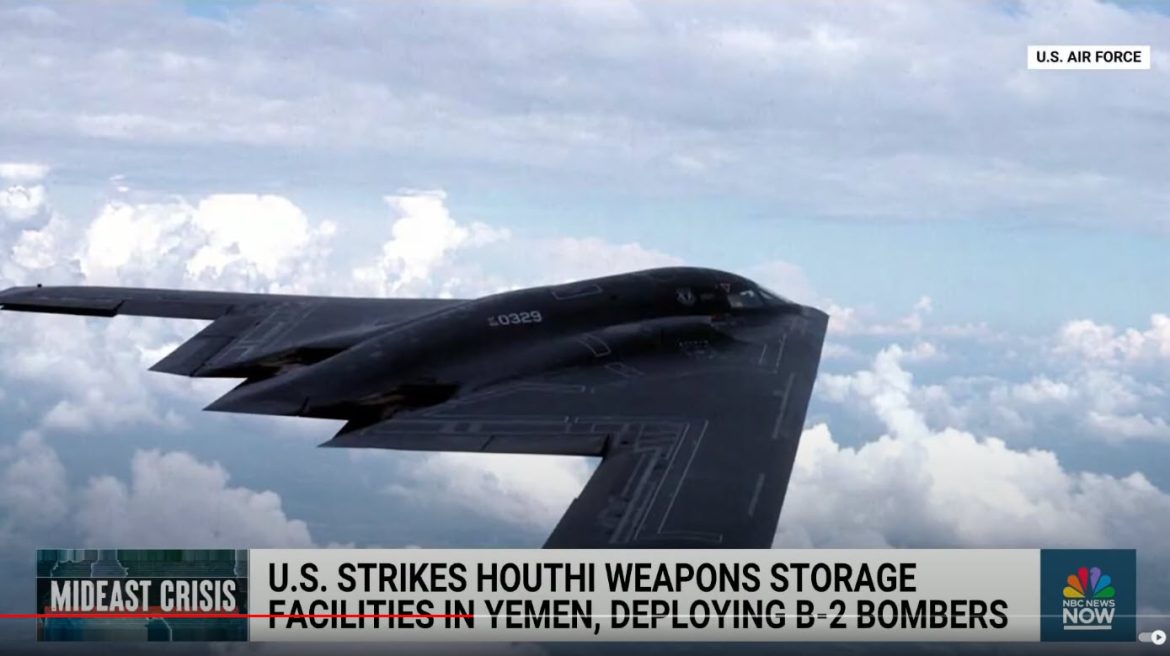In a significant military operation, the U.S. has launched airstrikes against Houthi targets in Yemen using B-2 stealth bombers, marking the first time these advanced aircraft have been deployed against the Iran-backed rebel group. The strikes, authorized by President Biden, targeted five underground weapons storage facilities believed to be critical to the Houthis’ ongoing military activities in the region.
The Pentagon confirmed that the precision airstrikes were carried out in response to escalating Houthi aggression, including attacks on international shipping in the Red Sea, one of the world’s most crucial waterways. The Houthis have claimed responsibility for a series of attacks over the past year, which they argue are in retaliation for the ongoing war in Gaza. U.S. officials, however, view these actions as a broader strategy by Iran-backed groups to destabilize the region.
According to reports from NBC News, Pentagon officials emphasized that the operation was a targeted effort aimed at dismantling the Houthis’ ability to wage further attacks. Meagan Fitzgerald, an NBC News correspondent, noted that the use of B-2 bombers is a notable shift in U.S. strategy. These stealth bombers are known for their ability to penetrate heavily defended airspace and deliver precise strikes on fortified targets. Their deployment underscores the gravity of the threat posed by the Houthis’ growing arsenal of weapons, particularly their underground storage facilities.
The strikes are intended not only to disable the Houthis’ military capabilities but also to send a clear message to Iran, which has been accused of supplying the Houthis with advanced weaponry and logistical support. The U.S. sees the Red Sea as a critical route for global trade, and any disruption in this area could have wide-reaching economic consequences. Protecting this waterway has become a top priority for both U.S. military and economic interests.
In the days leading up to the operation, tensions had escalated between the Houthis and international forces in the region. The rebel group has increasingly targeted civilian and military vessels in the Red Sea, a move that has drawn widespread condemnation. U.S. officials believe that neutralizing the Houthis’ underground storage sites could limit their ability to launch further attacks, safeguarding both international trade routes and regional stability.
This military action comes as the Biden administration seeks to balance its Middle East strategy amid various conflicts, including the ongoing war in Gaza. The White House has been clear that these airstrikes are not intended to escalate the situation further but are a necessary measure to protect U.S. interests and prevent the Houthis from threatening maritime security in the region.
Though the immediate impact of the strikes is still being assessed, Pentagon sources suggest that they have significantly weakened the Houthis’ capacity to store and deploy advanced weapons. However, military experts caution that the Houthis, who control large parts of Yemen, remain a formidable force, and further action may be needed to fully contain their influence.
Iran, which has long denied direct involvement in Houthi operations, is expected to respond diplomatically to the U.S. strikes. Tehran has previously condemned American military actions in the region, accusing the U.S. of exacerbating tensions. Meanwhile, regional and international allies are closely monitoring the situation to gauge its potential impact on broader Middle East security dynamics.
As the U.S. military continues to assess the success of the operation, officials are preparing for potential retaliation from the Houthis or their Iranian backers. Nonetheless, the strikes mark a critical moment in the U.S. military’s efforts to protect strategic assets and maintain stability in the volatile region.



